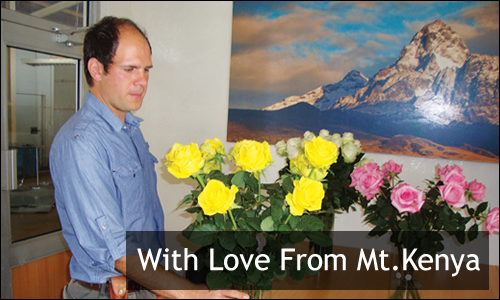 The floricultural arm of the illustrious Sunland Roses, sits like a jewel in the crown of the multi-faceted conglomerate. One of the leading farms for rose cultivation, Sunland Roses is a success story built upon years of dedication, and focused expansion.
The floricultural arm of the illustrious Sunland Roses, sits like a jewel in the crown of the multi-faceted conglomerate. One of the leading farms for rose cultivation, Sunland Roses is a success story built upon years of dedication, and focused expansion.
Sunland Roses’ over decade-long stint as premium rose cultivators has constantly seen up gradation and expansion. With an employee base of over 700 professionals and an export base of global reach, Sunland Roses continues to further its expansion plans in the floriculture business.
A growing demand and increase in popularity has helped Sunland Roses constantly propel itself to capture newer horizons. Mr. Harry Kruger said, “We are keenly looking at acquiring many more new varieties and technologies to add to its cultivation base and produce as well as invest in land conducive to the cultivation of high quality roses.”

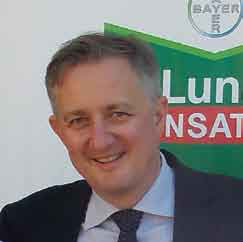 Damien Viollet, a Frenchman working for a German company doing business in East Africa, is at the coalface of juggling multiple, fundamentally different cultures. While Damien grew up in France, he has also lived in Germany in his adulthood and had to quickly learn that, for better or for worse, many stereotypes of the two nations contain an element of truth. And knowing how to handle them can open many doors. “The business environments in Germany and African countries are also completely different”, explains Mr. Damien.
Damien Viollet, a Frenchman working for a German company doing business in East Africa, is at the coalface of juggling multiple, fundamentally different cultures. While Damien grew up in France, he has also lived in Germany in his adulthood and had to quickly learn that, for better or for worse, many stereotypes of the two nations contain an element of truth. And knowing how to handle them can open many doors. “The business environments in Germany and African countries are also completely different”, explains Mr. Damien.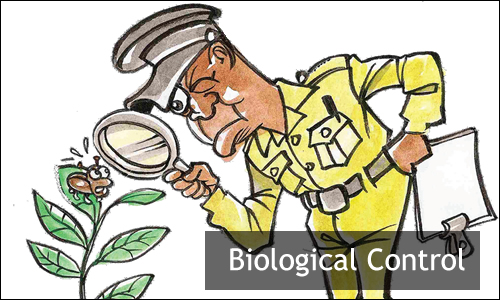 The crop protection industry is dominated by the large multinational agro-chemical companies such as Syngenta, Monsanto and Bayer Cropscience. The biocontrol business is minute in comparison, with only 3% of global sales of crop protection products. The future of the biocontrol industry is based on a range of interacting factors and difficult to predict the future, however many are suggesting that its future is likely to grow. There are numerous drivers for the use of biological control.
The crop protection industry is dominated by the large multinational agro-chemical companies such as Syngenta, Monsanto and Bayer Cropscience. The biocontrol business is minute in comparison, with only 3% of global sales of crop protection products. The future of the biocontrol industry is based on a range of interacting factors and difficult to predict the future, however many are suggesting that its future is likely to grow. There are numerous drivers for the use of biological control. Several rose varieties sold by European retailers suffer significant and unnecessary quality loss as a result of exposure to ethylene, a recent Dutch study has shown. With a few preventive measures, the post-harvest performance of these roses can be greatly improved. An alternative is to develop ethylene-resistant varieties. Either way, retailers will be able to offer consumers flowers with improved colour and opening and a vase life up to five days longer than today’s average.
Several rose varieties sold by European retailers suffer significant and unnecessary quality loss as a result of exposure to ethylene, a recent Dutch study has shown. With a few preventive measures, the post-harvest performance of these roses can be greatly improved. An alternative is to develop ethylene-resistant varieties. Either way, retailers will be able to offer consumers flowers with improved colour and opening and a vase life up to five days longer than today’s average.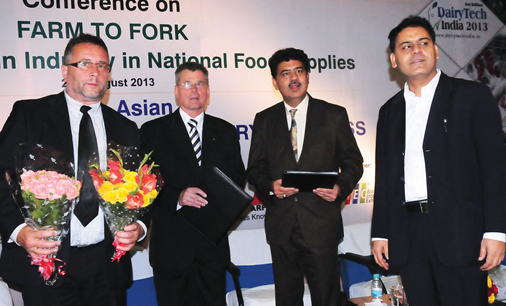
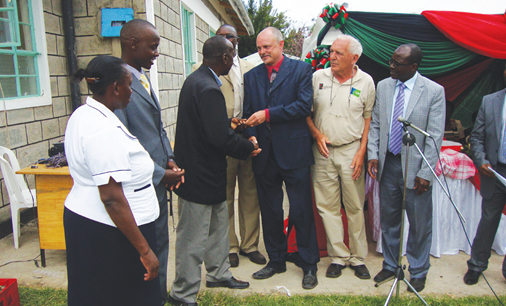 It was pomp and dance at a Nyamathi dispensary as villagers welcomed the handing over of the dispensary maternity wing. The handing over came with an almost audio-recorded oratory of the Naivasha Horticultural Fair Chairman Mr. Roddy Benjamin not frequently heard in this village. Co-ordinating well with seasoned Mr. Richard MCconel the vice Chairman, they touched the hearts of villagers who came in hundreds to grace the occasion.
It was pomp and dance at a Nyamathi dispensary as villagers welcomed the handing over of the dispensary maternity wing. The handing over came with an almost audio-recorded oratory of the Naivasha Horticultural Fair Chairman Mr. Roddy Benjamin not frequently heard in this village. Co-ordinating well with seasoned Mr. Richard MCconel the vice Chairman, they touched the hearts of villagers who came in hundreds to grace the occasion.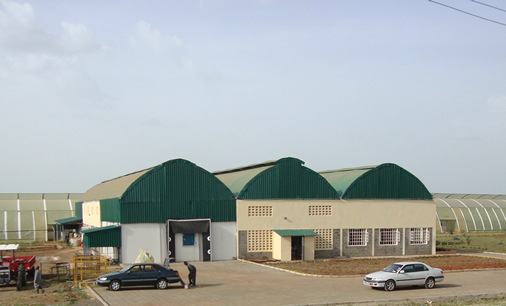 “Molo River Farm Ltd are making magic. In other word, they exist for the sake of simplicity. They channel their efforts into taking all the worries over farming and exporting of flowers from their customers, leaving them to concentrate on their core activities in other areas. Their contributions to the flower export business are brief, crisp, penetrating, perceptible, and above all creative insight into the minds of the consumers. Memorable ideas, images and stories, where there is more understanding triumph over information”, I concluded as Mr. Andrew Wambua took me round the farm. In his narration from one department to the other, one statement kept on recurring: No compromising of quality whatsoever.
“Molo River Farm Ltd are making magic. In other word, they exist for the sake of simplicity. They channel their efforts into taking all the worries over farming and exporting of flowers from their customers, leaving them to concentrate on their core activities in other areas. Their contributions to the flower export business are brief, crisp, penetrating, perceptible, and above all creative insight into the minds of the consumers. Memorable ideas, images and stories, where there is more understanding triumph over information”, I concluded as Mr. Andrew Wambua took me round the farm. In his narration from one department to the other, one statement kept on recurring: No compromising of quality whatsoever. Q. Briefly discuss Margaret Njambi (Personal background and professional background to your current position as Technical Manager East Africa, Lawn and Garden at Syngenta East Africa Ltd.)
Q. Briefly discuss Margaret Njambi (Personal background and professional background to your current position as Technical Manager East Africa, Lawn and Garden at Syngenta East Africa Ltd.)